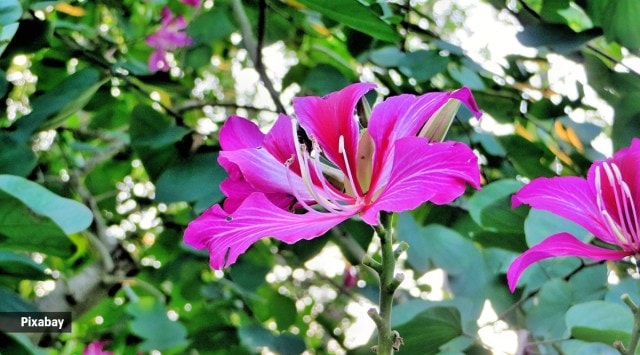📣 For more lifestyle news, click here to join our WhatsApp Channel and also follow us on Instagram
If you spot this tree, ‘take the bark, wash, clean, dry it, make a powder, and boil it’; here’s why
Ayurveda suggests the use of certain trees and herbs that have been shown to offer a wide range of health benefits
 Kanchanara is a small to medium-sized deciduous tree (Source: Pixabay)
Kanchanara is a small to medium-sized deciduous tree (Source: Pixabay)Ayurveda has long recognised the importance of natural remedies for promoting health and well-being. This traditional medicine system, in particular, suggests the use of certain trees and herbs that have been shown to offer a wide range of health benefits. These include well-known herbs such as turmeric, ginger, holy basil, ashwagandha, and neem, along with several lesser-known trees and herbs. One such medicinal plant, according to Ayurveda, is Kanchanara, also known as Bauhinia variegata or Mountain Ebony.
According to Rajinder Dhamija, Ayurveda Expert and Founder, Dharishah Ayurveda, “Kanchanara is an Indian plant endemic to Southeast Asian nations such as Sri Lanka, Thailand etc. It’s also known as the orchid tree and camel’s foot. Kachnar flowers appear as filled buds before opening in beautiful colours of vibrant pink and sparkling white, with five petals.” He added that the roots, stems, leaves, blossoms, and seeds of the Kanchanara are all filled with beneficial nutrients and medicinal substances that offer incredible benefits for general well-being.
Underscoring the same, Dr Rekha Radhamony, an Ayurveda expert, took to Instagram to share, “Kanchanara (Bauhinia variegata) has multiple uses in Ayurveda — not as a single herb — but most effective when used with other herbs, especially in the treatment of hypothyroidism and cancer.” However, she was quick to add that one must consult a doctor before trying this herb and not buy single-ingredient Kanchanara powder or tablets and consume it thinking it will help with thyroid.
View this post on Instagram
However, you can surely use it as a simple topical home remedy. “One home remedy you can try, if you have a Kanchara tree around you, is to take the bark, wash, clean, dry it, make a powder, boil it in water and use it for gargling,” Dr Radhamony suggested, sharing that if you have frequent mouth ulcers or have wounds, it has great healing properties.
Calling it “a golden elixir”, Dhamija said that it is beneficial in the treatment of various ailments such as bleeding haemorrhoids, cough, diarrhoea, dysentery, heartburn, hematuria, indigestion, malaria, menorrhagia, skin diseases, sore throat, TB, dyspepsia, bronchitis, leprosy, ulcer, obesity, and worms. “Kanchara’s antihelmintic, astringent, anti-leprotic, and anti-microbial properties make it a valuable Ayurvedic medication.”
As per Vikas Chawla, Ayurveda Expert, Vedas Cure, One of the most essential benefits of the plant in Ayurveda is its ability to balance the three doshas – Vata, Pitta, and Kapha. “Kanchanara is widely known for its anti-inflammatory, anti-tumour, anti-fungal, and anti-bacterial properties. It is rich in antioxidants and contains several bioactive compounds with therapeutic benefits”
While Dr Radhamony suggests avoiding consuming single-ingredient Kanchanara power, Dhamija said that the most effective way to achieve the finest results is to take one-fourth or half teaspoon of Kanchnanara powder and drink it with lukewarm water or honey twice a day.
Chawla, too, said that it can be used in several forms, such as powder, decoction, and oil. “The plant’s bark and leaves are commonly used to make herbal decoctions that can be consumed orally. Kanchanara powder can be mixed with water or honey and consumed as a tonic. Its oil is used for external application and can be used to treat skin disorders,” he said.
“However, it is not indicated for persons who have kidney impairment, liver abnormalities, or who have recently received substantial therapy or surgery for other pre-existing health concerns, since it may cause inadequate absorption in the blood and severe internal tissue damage. Furthermore, pregnant and lactating women should avoid Kanhanara due to its hormone-influencing qualities,” Dhamija added.
📣 For more lifestyle news, follow us on Instagram | Twitter | Facebook and don’t miss out on the latest updates!
📣 For more lifestyle news, click here to join our WhatsApp Channel and also follow us on Instagram
- 01
- 02
- 03
- 04
- 05



























